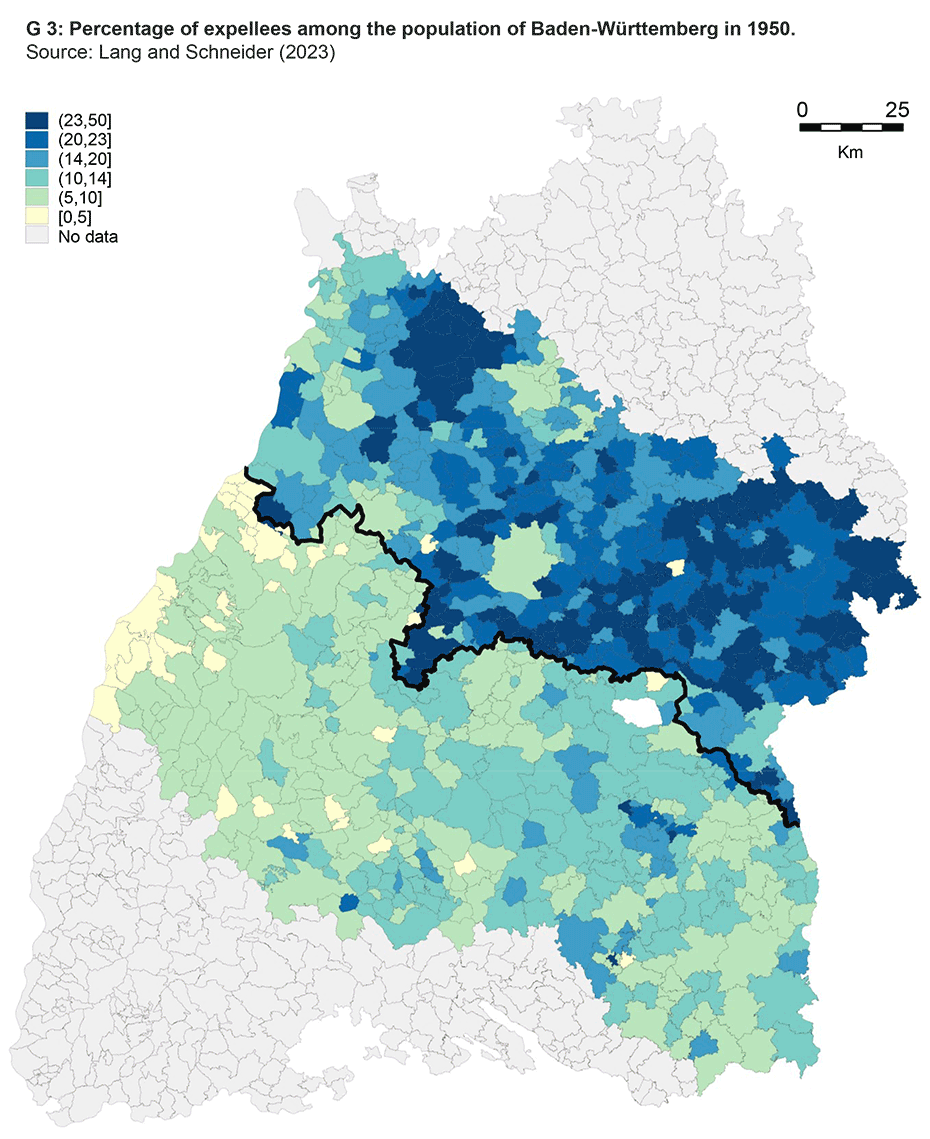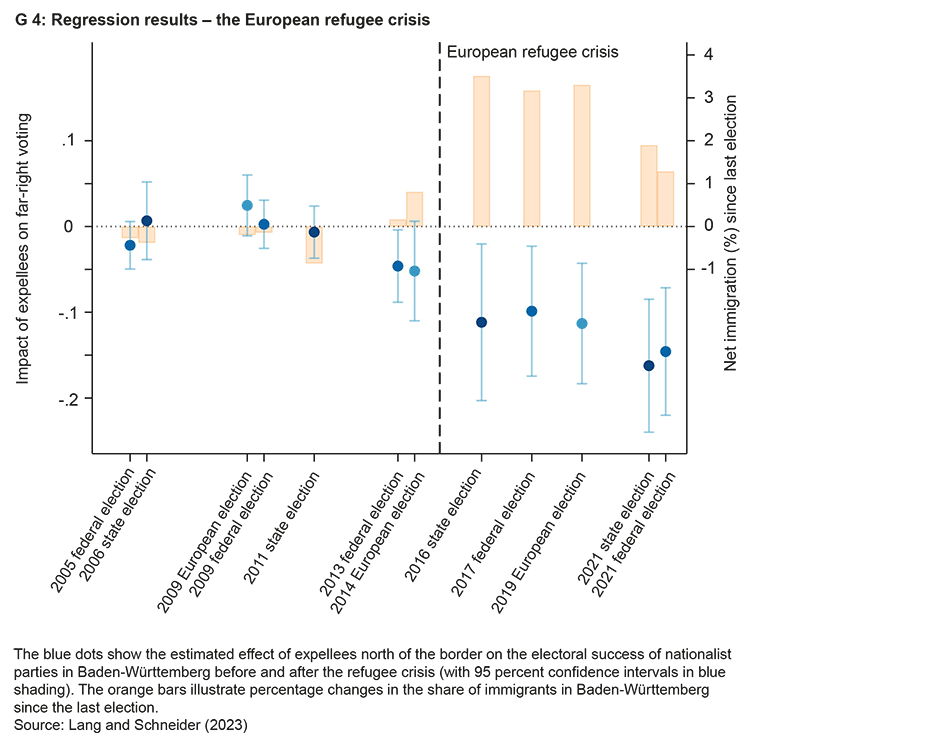
Long-term experience of immigration weakens nationalist parties
In many countries, support for xenophobic views varies considerably from region to region. It is often strongest in areas without a large proportion of foreigners. A new study shows that a lack of local experience with immigration is partly responsible for this. Regions that have had more experience with immigration and integration in the past exhibit a much weaker nationalist backlash against new waves of immigration.
Nationalist parties are gaining support in many countries. Although a whole range of developments have contributed to this trend, one issue clearly stands out: immigration. Whether it is the Schweizerische Volkspartei (SVP), the Alternative für Deutschland (AfD), the Rassemblement National (RN) in France or the Fratelli d’Italia (FdI), the supporters of these parties are united by their sceptical attitude towards immigration. It is no coincidence that they have become increasingly popular during recent refugee crises, and several studies have found clear correlations between the vote shares of nationalist parties and immigration (see, for example, Dustmann et al., 2019; Hangartner et al., 2019).
Although nationalist parties are thus becoming increasingly successful in Europe, it would be too simplistic to speak of a general societal trend towards a widespread scepticism about migration. On the contrary, support for nationalist parties varies considerably between population groups and regions. For example, while nationalists occasionally achieve absolute majorities in some rural and economically weaker regions of many European countries, they do not get beyond single-digit vote shares in many cities. Here, nationalist policies are often strongly rejected and immigration receives support. But what are the causes of this societal polarisation? Why do political attitudes to immigration vary so much from region to region?
A new analysis by Stephan Schneider (KOF, ETH Zurich) and Valentin Lang (University of Mannheim) studies this question. The two political economists argue that long-term experience of immigration plays a decisive role. Areas where voters or their ancestors have had extensive experience of immigration in the past may react differently to current immigration than people in areas that do not have such experience. Put simply, there is a lesson to be learned from experience.
Uneven distribution of German expellees as a natural experiment
To investigate this hypothesis, the researchers analysed election results over a period of almost 100 years in the municipalities of a region that represents an ideal laboratory for this study: the southwest of Germany bordering Switzerland. This region, today known as Baden-Württemberg, was divided into a French and a US occupation zone for a few years following the Second World War. When more than ten million German-speaking people had to flee from Germany’s former eastern territories and other parts of Eastern Europe within a short period after the war, only the Americans accepted these displaced persons in their occupation zone in the southwest. The French occupiers refused.
As Chart G 3 shows, this resulted in very different proportions of immigrants north and south of the occupation zone border. In the north, the population share of expellees in some municipalities exceeded 20 percent. As this short-lived border was arbitrarily drawn along the German A8 motorway, the regions surrounding it are very similar. The only difference is that many more expellees settled in the north than in the south. This makes it possible to study the causal effects of this historical immigration episode using statistical methods.
The study compares the election results of all German federal elections in the municipalities north and south of this former border, which has had no meaning since 1949. As a statistical method the authors use a spatial regression discontinuity design that isolates the effect along the border by statistically eliminating other possible influencing factors. It turns out that in the last federal elections in 2021, the nationalist AfD received significantly more votes in municipalities south of the former border than north of the border, where more expellees had settled in the 1940s. According to estimates, the AfD’s vote share was 1.5 percentage points lower north of the former border, which is a significant proportion of its overall election result of about 10 percent in Baden-Württemberg. This effect can also be observed in previous elections, and especially when the recent influx of immigrants was particularly high. Chart G 4 illustrates this result: municipalities just north of the occupation zone border, i.e. those with a higher proportion of expellees, vote less for nationalist parties when there is currently more immigration – for instance, at the time of the European refugee crisis.
Passing on experiences in families and the collective memory
To further investigate how these results come about, the authors of the study conducted a representative survey among 3,000 people in Baden-Württemberg. The findings of the survey clearly show that the observed relationship is, partly, due to the attitudes of the expellees’ descendants. On average they express much more pro-immigration and less nationalistic views, even though the public perception in Germany is that expellees tend to be politically right-of-centre.
At the same time the survey shows that this effect can also be observed among people who are not direct descendants of expellees. Simply reactivating the memory of the historical experience of the influx of expellees prompts more pro-immigration responses – even among people who are only familiar with this episode from hearsay. In fact, there is also evidence in the data that respondents acknowledge long-term regional growth effects of this wave of immigration. Apparently, both expellees and natives have had good experience of immigration in the long run and have passed this experience on to their descendants. They are therefore also more positive about current immigration, even though the migrants of that time and today are very different in many respects.
The results thus show that one explanation for the often strongly polarised view of immigration can be found in the past. People who have little personal experience of large waves of immigration often react negatively to immigration in the short term. Their concerns about economic issues and social tensions are too great. Over the long term, however, past immigration is often viewed more positively than initially expected and scepticism of migration decreases when people have had such positive experience.
It is important to note that the study draws these conclusions from a context in which the integration of immigrants with similar cultural backgrounds has been demonstrably successful. What is striking, however, is that the results consistently show that voters associate past immigration experience with current immigration, even though the integration of current immigrants with different cultural backgrounds may be associated with more social friction. Given that past experience resonates in various contexts and over long periods of time, the successful integration of immigrants is of great importance because its political consequences continue to be felt decades later.
Sources
Hangartner, Dominik, Elias Dinas, Moritz Marbach, Konstantinos Matakos, & Dimitrios Xefteris (2019): Does Exposure to the Refugee Crisis Make Natives More Hostile? American Political Science Review 113.2, pp. 442–455.
Dustmann, Christian, Kristine Vasiljeva, & Anna Piil Damm (2019): Refugee Migration and Electoral Outcomes. The Review of Economic Studies 86.5, pp. 2035–2091.
Lang, Valentin & Stephan A. Schneider (2023): Immigration and Nationalism in the Long Run. Working Paper. external pagehttps://papers.ssrn.com/sol3/papers.cfm?abstract_id=4212484
Contacts
Professur f. Wirtschaftsforschung
Leonhardstrasse 21
8092
Zürich
Switzerland


